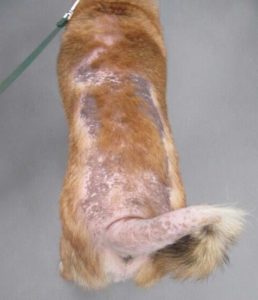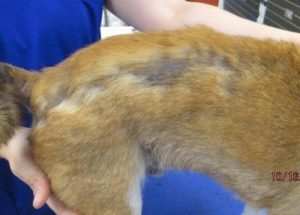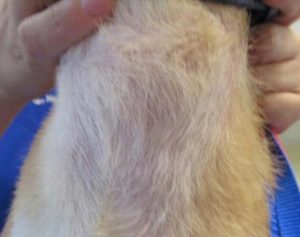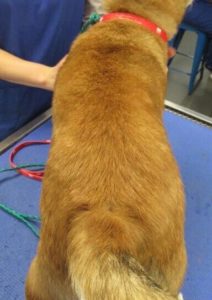
Do you ever have an itch that you can’t scratch? Now imagine that itch is your entire body. Calvin is an unlucky pup whose entire body was itchy. He had scratched so much that he had lost large patches of fur and damaged his skin. His damaged skin then became infected and painful.
The only luck Calvin had was bad luck; not only did he have a severe skin disease, but he also did not have a home. We all want to think looks do not matter but unfortunately, they do. Poor Calvin was up for adoption but he was not looking his best. Little did he know that his luck was about to change.
He was adopted in spite of his baldness and skin infection. Luckily his new owners were able to see past his looks and appreciate his wonderful personality.
As veterinarians, anytime we see loss of normal fur and skin lesions we think of allergies. In dogs, allergies can be caused by parasites (ex: fleas or mites), inhaled allergens (ex: pollens, dust, molds, dander) and foods. The most common symptoms of allergies in dogs are itchy skin which leads them to lick, chew, rub and scoot. In addition, they frequently develop skin and ear infections. Calvin’s severe itching and skin infections were a result of allergies.
The shelter that Calvin was at, started him on excellent flea control, a prescription hypoallergenic diet, and antibiotics for his skin infection. His new owners then brought him to Hawthorne Hills Veterinary Hospital for a check-up. They were committed to treating his skin disease. Treatment can be frustrating for the patient, the owner and the veterinarian as sometimes a number of different protocols may be needed until the right combination is found.
Fortunately for Calvin, he responded well to his hypoallergenic diet, flea control, and daily allergy medication. After several months all his fur has regrown and he is a happy, healthy and handsome dog.
Allergies are common in our pets and they can cause repeated skin and ear infections, itching, and fur loss. It can be a very debilitating and painful condition.
- The most common allergy is to fleas with many pets reacting to just a few fleas, which means owners may not ever ‘see’ the fleas themselves. All pets with allergies must have excellent flea control year-round.
- The second most common allergy is inhalant allergies, also called atopic dermatitis. There are numerous treatments for this as not one treatment works for every patient. In some cases, it is beneficial to have the pet allergy tested to determine exactly what they are reacting to in order to formulate the best treatment plan.
- Last but not least is food allergy, the least common allergy in our pets. Pets are allergic to the PROTEIN in the diet. The most in dogs and cats are reactions to beef, chicken, dairy, and egg. There is no specific test for food allergies, other than eliminating the food from their diet completely. In most cases this requires a prescription food formulated for allergies and made in dedicated factories to avoid cross-contamination with other ingredients.
For some unlucky pets, they can have food, flea, and inhalant allergies! These health issues can be frustrating to manage as there is no cure, but most patients can be well controlled with the help of excellent veterinary care and dedicated owners. There are numerous safe and effective treatment options available now and finding the right option for any pet is possible.
Calvin is now living an itch free and happy life in his new home!
Resources:
Inhalant Allergies
https://veterinarypartner.vin.com/default.aspx?pid=19239&id=4951475
https://bluepearlvet.com/medical-articles-for-pet-owners/atopic-dermatitis-in-pets/
Allergies
https://veterinarypartner.vin.com/default.aspx?pid=19239&id=4952662
https://www.cavd.ca/images/CAVD_ITCH_SCALE.pdf
Food Allergies
https://vetnutrition.tufts.edu/2017/01/food-allergies/
https://veterinarypartner.vin.com/default.aspx?pid=19239&id=4951526

 6512 12th Ave NE
6512 12th Ave NE









